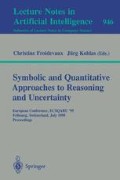Abstract
The purpose of this paper is to provide a comparative study of non-monotonic syntax-based consequence relations, from different points of view. Starting from a (not necessarily consistent) belief base E and a pre-ordering on E, we first remind different mechanisms for selecting preferred consistent subbases in syntax-based approaches. Then, we present three entailment principles in order to cope with these multiple subbases. The crossing point of each generation mechanism and each principle defines a syntax-based consequence relation.
Pursuing previous work of the authors concerning the computational complexity point of view, we first provide a comparison from the cautiousness point of view. Our proposal restates previous results [18] in a single framework and provides new results. In the last part of this paper, we study the validity of deduction rules (such as those introduced by [15, 12]). Results are discussed in the conclusion.
Preview
Unable to display preview. Download preview PDF.
References
Salem Benferhat. Raisonnement non-monotone et traitement de l'inconsistance en logique possibiliste. PhD thesis, UPS-IRIT. France, February 1994.
Salem Benferhat, Claudette Cayrol, Didier Dubois, Jérôme Lang, and Henri Prade. Inconsistency management and prioritized syntax-based entailment. In Proc. of the 13 th IJCAI, pages 640–645, Chambéry, France, 1993. Morgan-Kaufmann.
Salem Benferhat, Didier Dubois, and Henri Prade. Argumentative inference in uncertain and inconsistent knowledge bases. In Proc. of the 9th UAI, pages 411–419, Washington, DC, 1993. Morgan-Kaufmann.
Stefan Brass. On the semantics of supernormal defaults. In Proc. of the 13th IJCAI, pages 578–583, Chambéry, France, 1993. Morgan-Kaufmann.
Gerhard Brewka. Preferred subtheories: An extended logical framework for default reasoning. In Proc. of the 11th IJCAI, pages 1043–1048, Detroit, MI, 1989. Morgan-Kaufmann.
Claudette Cayrol. From non-monotonic syntax-based entailment to preference-based argumentation. In Proc. of ECSQARU-95, in mis volume, Fribourg, Switzerland, 1995.
Claudette Cayrol and Marie-Christine Lagasquie-Schiex. Classification de relations d'inférence non-monotone: la prudence et les propriétés de déduction. Technical Report 94-49R, UPS-IRIT. France, November 1994.
Claudette Cayrol and Marie-Christine Lagasquie-Schiex. On the complexity of non monotonic entailment in syntax-based approaches. In Proc. of the 11th ECAI workshop on Algorithms, Complexity and Commonsense Reasoning, Amsterdam, Nederland, 1994.
Claudette Cayrol, Véronique Royer, and Claire Saurel Management of preferences in assumption-based reasoning. In Advanced methods in AI. Lecture notes in computer science 682, pages 13–22. Springer Verlag, 1992.
Didier Dubois, Jérôme Lang, and Henri Prade. Inconsistency in possibilistic knowledge bases — to live or not to live with it. In Fuzzy logic for the Management of Uncertainty, pages 335–351. Wiley and sons, 1991.
M. Elvang-Goransson, J. Fox, and P. Krause. Dialectic reasoning with inconsistent information. In Proc. of the 9th UAI, pages 114–121, Washington, DC, 1993. Morgan-Kaufmann.
Peter Gärdenfors and David Makinson. Nonmonotonic inference based on expectations. Artificial Intelligence, 65:197–245, 1994.
H. Geffner. Default reasoning: Causal and Conditional Theories. MIT Press, 1992.
A. Hunter. Defeasible reasoning with structured information. In Proc. of the 4th KR, pages 281–292, Bonn, Germany, 1994.
Sarit Kraus, Daniel Lehmann, and Menachem Magidor. Nonmonotonic reasoning, preferential models and cumulative logics. Artificial Intelligence, 44:167–207, 1990.
Daniel Lehmann. Another perspectiveon default reasoning. Technical Report 92-12, Leibniz Center for Research in Computer Science. Hebrew University of Jerusalem, Israel, July 1992.
Bernhard Nebel. Belief revision and default reasoning: Syntax-based approaches. In Proc. of the 2nd KR, pages 417–428, Cambridge, MA, 1991. Morgan-Kaufmann.
Gadi Pinkas and Ronald P. Loui. Reasoning from inconsistency: A taxonomy of principles for resolving conflict. In Proc. of the 3rd KR, pages 709–719, Cambridge, MA, 1992. Morgan-Kaufmann.
G.R. Simari and R.P. Loui. A mathematical treatment of defeasible reasoning and its implementation. Artificial Intelligence, 53:125–157, 1992.
Author information
Authors and Affiliations
Editor information
Rights and permissions
Copyright information
© 1995 Springer-Verlag Berlin Heidelberg
About this paper
Cite this paper
Cayrol, C., Lagasquie-Schiex, MC. (1995). Non-monotonic syntax-based entailment: A classification of consequence relations. In: Froidevaux, C., Kohlas, J. (eds) Symbolic and Quantitative Approaches to Reasoning and Uncertainty. ECSQARU 1995. Lecture Notes in Computer Science, vol 946. Springer, Berlin, Heidelberg. https://doi.org/10.1007/3-540-60112-0_13
Download citation
DOI: https://doi.org/10.1007/3-540-60112-0_13
Published:
Publisher Name: Springer, Berlin, Heidelberg
Print ISBN: 978-3-540-60112-8
Online ISBN: 978-3-540-49438-6
eBook Packages: Springer Book Archive

